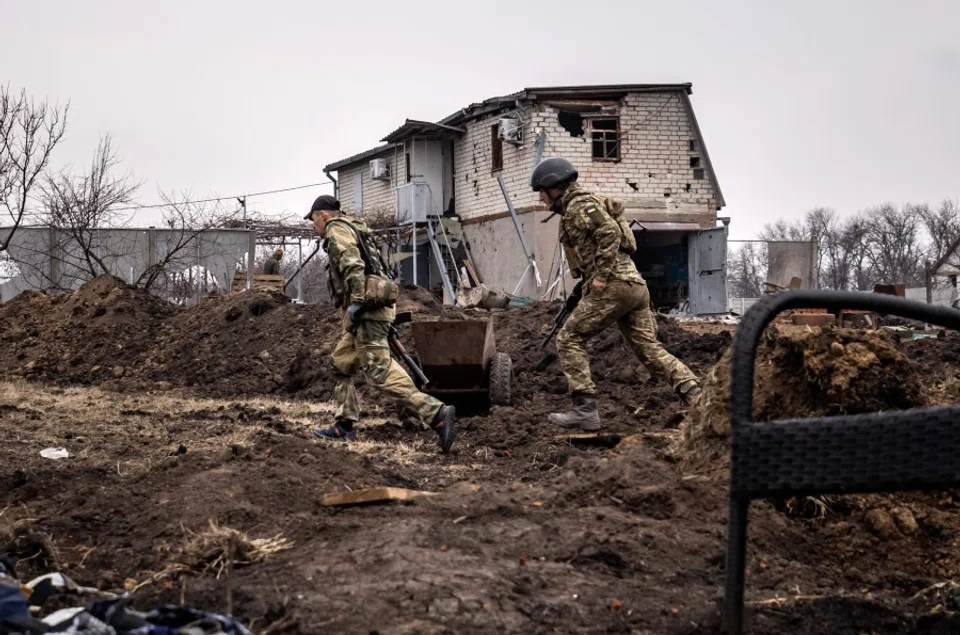China must reflect on its third-party position in the Russia-Ukraine war
Despite being a third party to the Russia-Ukraine conflict, China has been hit with heavy criticism from the Western powers, especially the US, about its position in the war. Chinese academic Fan Hongda believes that while the West does have a powerful media machine behind it that paints China in an unfavourable light, the latter also needs to reflect on its responses to external conflicts, and its lack of domestic channels for the Chinese to voice their diverse views.

Since the Russia-Ukraine war broke out on 24 February, China's position on the war has repeatedly become the focus of foreign and particularly Western media. The latter has been critical of China simply because it did not outrightly oppose Russia's invasion of Ukraine.
Senior Ukrainian officials have also openly expressed their dissatisfaction with China. At the same time, foreign political figures, including American politicians, have been vocal in expressing their views about China's position in the war and the country being a supporter of Russia. Amid the din, US officials and media have interpreted the 18 March video call between Chinese President Xi Jinping and US President Joe Biden as that of the US warning China against providing material support to Russia's invasion of Ukraine.
China as a third party
Objectively speaking, based on the position of the Chinese foreign ministry following the outbreak of the Russia-Ukraine war, China does not support Russia starting the war in Ukraine, but instead advocates "respect for the sovereignty and territorial integrity of all countries" and calls on "Ukraine and Russia to find a solution through negotiations" - this is an appropriate stand for a third party.
Clearly, China's stand is not serving the needs of the US and other major powers.

But at the same time, China has pointed out that Russia's military action against Ukraine is largely the result of the US and the West not addressing Russia's "legitimate security concerns" and repeatedly promoting the eastward expansion of NATO, a product of the Cold War. China has also highlighted that instead of actively promoting peace talks, the US and other major powers are providing large quantities of weapons to Ukraine, which is not conducive to peace.
Clearly, China's stand is not serving the needs of the US and other major powers.
The truth is, where this war is concerned, China is in a fundamentally different position from the other major powers. It is an absolute third party while NATO powers such as the US are among the key players of the Ukraine crisis as China sees NATO's eastward expansion as one of the key triggers of the war.
It is then easy to understand why the US and other major powers are not happy with China's refusal to condemn Russia. They need China to stand in clear opposition to Russia and join forces with them in condemning and sanctioning Russia, which is on relatively friendly terms with China.

It is also understandable that China has rejected the US's request to condemn Russia as this would be damaging to China's national interest. China wants to make a stand as a third party in this war. China does not want to be a party directly driving the war like the US, while condemning and sanctioning the warring nation.
Besides, the US's China policy in recent years has shown that Washington's decision makers do not consider China as a friend but as a strategic rival, and have repeatedly oppressed and contained China. Why should China abandon its relatively objective third-party position on the war and the friendly relationship that it has developed with Russia in recent years just because the US, which sees China as a rival or even an enemy, wants it to do so? It is clear that Beijing's decision makers will not oblige.
In the initial stages of the war, the Chinese media used more Russian news sources, and seemed optimistic about the outlook of the Russian offensive.
Impact on China's image and interest
Since China is not cooperating with the US, US politicians and media outlets began harshly attacking China's position on the Russia-Ukraine war. Given the international influence of the US and its mainstream media, China has been portrayed as a supporter of Russia, the "aggressor".

There is no doubt that China's image in the international community has suffered some damage because of its position on the Russia-Ukraine war. While this is the result of intentional actions by the US and other big countries, China also needs to do some reflection.
Notably, media coverage in the internet era is rather indelible. In the initial stages of the war, the Chinese media used more Russian news sources, and seemed optimistic about the outlook of the Russian offensive. Such journalism was not sufficiently comprehensive or objective, and it also did some damage to Ukraine, which was the other party in the war.
Now, Ukraine's worsening attitude towards China is clear. On 18 March, a Ukrainian deputy prime minister posted on social media harsh criticism of the comments made by China's foreign ministry spokesperson. And on 19 March, Mykhailo Podoliak, adviser to the head of the office of the president of Ukraine, also made sharp remarks against China on social media, and called on China to condemn Russian barbarism and stand with the coalition of civilised countries.

Indeed, even if China-Ukraine relations recover after the conflict, it will take time; while the post-war attitude of Ukrainians towards China is even less promising.
Even as a third party that has not provided practical support, such as weapons, to any of the warring parties, China has received negative sentiments from at least one of them. It is already self-evident that the Russia-Ukraine war will hurt China, simply by observing the attitude of Ukraine towards China.
When complex international issues arise, China needs to have a diverse set of voices, and it needs to provide media and public platforms or channels for these different voices to be heard.
China needs diverse voices
The negative impact of the external war on China is unfortunate, but it is not merely the result of the US and other big powers fanning the flames in Ukraine - China's policymakers also need to deeply reflect.
Part of this reflection has been manifested through media reports. Chinese state media has gradually adjusted from its initial over-reliance on Russian news sources, and is now giving more coverage to Ukraine and its fierce resistance against Russia's attacks. Positive reports on Ukraine, including articles from mainstream media in the US and other Western powers, have also been republished.

In fact, since the start of the war, different opinions have existed in China. For example, some professors from top Chinese universities released an open letter objecting to Russia initiating the war against Ukraine, which reflects the divergent views of Chinese academics on the war. Also, among China's online community, there have always been many voices that are sympathetic towards Ukraine.
When complex international issues arise, China needs to have a diverse set of voices, and it needs to provide media and public platforms or channels for these different voices to be heard. This would help other countries gain a more objective understanding of China's stand.
... when China is a third party in a conflict, even if it cannot gain the goodwill of a party involved in the conflict, it should avoid attracting their hostility.
Also, it is a known fact that the US is suppressing, containing and hitting out at China, and China has an inherent need to firmly counter the US's offensive. However, to avoid hurting any third party in the process, China needs to be more prudent in its tussles with the US.
Conflicts are rife in today's world, and China urgently needs to come up with more appropriate responses. In particular, when China is a third party in a conflict, even if it cannot gain the goodwill of a party involved in the conflict, it should avoid attracting their hostility.
Related: Did China miscalculate the Ukraine war? | Must China choose sides in the Russia-Ukraine war? | Will China condemn Russia over reports of war crimes in Ukraine? | Does Beijing benefit from US-Russia confrontation over Ukraine? | How will the Ukraine war affect China's foreign policy? | China's tricky position on the Russia-Ukraine war





![[Photos] Fact versus fiction: The portrayal of WWII anti-Japanese martyrs in Taiwan](https://cassette.sphdigital.com.sg/image/thinkchina/3494f8bd481870f7c65b881fd21a3fd733f573f23232376e39c532a2c7593cbc)